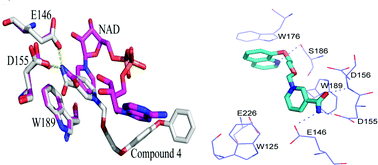Design, synthesis and biological characterization of novel inhibitors of CD38†
Abstract
Human CD38 is a novel multi-functional

* Corresponding authors
a
State Key Laboratory of Natural and Biomimetic Drugs, School of Pharmaceutical Sciences, Peking University, Beijing 100191, China
E-mail:
zdszlh@bjmu.edu.cn
Fax: +86-10-82802724
Tel: +86-10-82801700
b
Department of Physiology, University of Hong Kong, Hong Kong, China
E-mail:
leehc@hku.hk
Fax: +852-2817-1334
Tel: +852-2819-9163
c MacCHESS, Cornell High Energy Synchrotron Source, Cornell University, Ithaca, USA
Human CD38 is a novel multi-functional

 Please wait while we load your content...
Something went wrong. Try again?
Please wait while we load your content...
Something went wrong. Try again?
M. Dong, Y. Si, S. Sun, X. Pu, Z. Yang, L. Zhang, L. Zhang, F. P. Leung, C. M. Ching. Lam, A. K. Y. Kwong, J. Yue, Y. Zhou, I. A. Kriksunov, Q. Hao and H. Cheung Lee, Org. Biomol. Chem., 2011, 9, 3246 DOI: 10.1039/C0OB00768D
To request permission to reproduce material from this article, please go to the Copyright Clearance Center request page.
If you are an author contributing to an RSC publication, you do not need to request permission provided correct acknowledgement is given.
If you are the author of this article, you do not need to request permission to reproduce figures and diagrams provided correct acknowledgement is given. If you want to reproduce the whole article in a third-party publication (excluding your thesis/dissertation for which permission is not required) please go to the Copyright Clearance Center request page.
Read more about how to correctly acknowledge RSC content.
 Fetching data from CrossRef.
Fetching data from CrossRef.
This may take some time to load.
Loading related content
